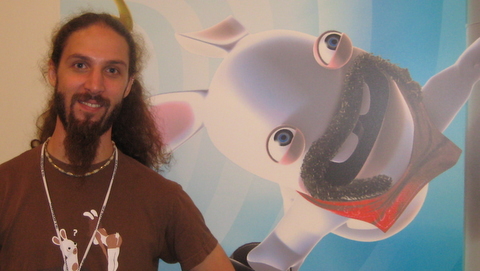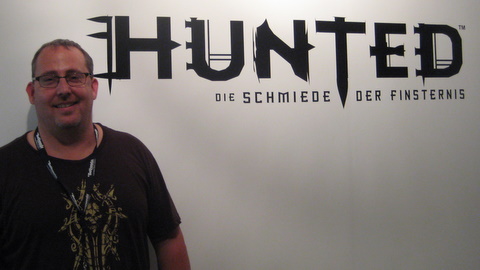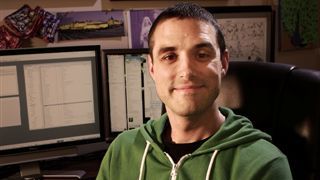Two weeks ago, the German based adventure game studio Animation Arts released Lost Horizon, their newest adventure title. Animation Arts’ managing director, Marco Zeugner, (middle) talked with us about how the company was founded, the challenges of conquering the German adventure market and why it’s smart to remain small.
main
Development
Relic Entertainment’s Quinn Duffy and Raphael van Lierop on going from RTS to shooters in the Warhammer 40K Universe
Showing off the latest iteration of their first third-person shooter, Relic Entertainment’s game director Raphael van Lierop and principal designer Quinn Duffy were measuring reactions to the latest pre-alpha footage of Warhammer 40K: Space Marine they were showing off to press. We took up their valuable 15 minute break between a couple of press presentations to talk with them about the breath of fresh air the studio’s enjoying by making a third-person shooter after almost two decades of RTS development.
Development
A chat with Stunlock Studios’ Tau Petersson on starting a studio fresh out of college, getting a publishing deal with Funcom and becoming a professional game developer overnight.
Not every student team that finishes their final year in college is as fortunate to have a game picked up by a major publisher. But Stunlock Studios got a golden ticket from Norwegian online game publisher Funcom and is now working tirelessly on their first commercial game called Bloodline Champions, a multiplayer online battle arena using Microsoft XNA. We asked Stunlock Studios’ CEO, Tau Petersson (the only lady in the team), about her team’s experience starting their studio fresh out of college, getting a publishing deal from Funcom and the lessons they’ve learned during their journey to becoming professional game developers.
Development
A chat with Krome Studios’ Steve Stamatiadis on pitching comic books, creating Blade Kitten and going downloadable

Development
Irrational Games’ Shawn Robertson on breaking out of Rapture
If it’s up to Irrational Games’s lead artist Shawn Robertson, breaking out of the world of Rapture with Bioshock: Infinite was a huge blessing. “Bioshock is bigger than Rapture,” Robertson explained after his presentation to the press. “When we were looking at creating Bioshock Infite, there were no sacred cows for us. We really wiped the slate clean and only brought back things that we were really interested in preserving. Bioshock to us is foremost about telling a story and immersing people in an environment and secondly about giving them the tools to go through that environment and solve problems.”
Fresh start
Revealing the game at Gamescom Cologne, Robertson didn’t have a hard time giving presentations to hordes of approving members of the press. Development wise, Infinite was a completely fresh start for him and his team. “There are no shared assets, nothing, no code, no art and a totally new engine,” Robertson added. Though realizing the new vision for Bioshock Infinite wasn’t easy according Robertson, he praises his tech team for achieving the goals they set out to achieve for Infinite. “We don’t like to make things easy on ourselves,” Robertston admits. “But if we’re going to do a city in the sky, we’re really going to do that 100%.”
To the skies!
Literally “looking to the skies for new ideas,” Robertson and the Bioshock Infinite team are determined to break new grounds and challenge themselves. “We always look at our previous games and try to see how we can outdo ourselves,” he explains. “I think we tend to be our own worst critics.”
While the game was being presented in a classical gentlemen’s club like room filled with luxurious Chesterfield couches, the outside hallways were filled with fictional propaganda praising the glory of a 1930’s United States in its scientific prime. One would consider those art pieces to be the brilliant work of a handful of Irrational employees, but surprisingly appears to be the collective effort of many. “We don’t really have a specific team set up for that,” Robertson admits.
Bioshock: Infinite is currently in development by Irrational Games and has been scheduled for release in 2012
Business
PopCap’s Jason Kapalka on the state of social games, Zuma Blitz and the future of downloadable games
If it’s up to PopCap’s co-founder and chief creative officer Jason Kapalka, we would never the see inside of a retail store in the near future and download all our games from home. At least that’s what he’s been doing the past couple of years. Readying up to launch a new social game called Zuma Blitz, Kapalka took the time to talk with us about the current state of social games, PopCap’s development philosophy and the future of the casual downloadable game market.
The Facebook Nerf
Many industry professionals believe that social games on Facebook have gotten a beating recently. Nevertheless, Kapalka does not seem to worry. “It’s true that Facebook has neutralized a lot of more effective viral channels,” Kapalka admits. “From our point of view, we’re doing fine. Bejeweled Blitz is actually going well. Its peek was just last week. I don’t know if that’s because we’re really smart or really lucky. I think part of it is that we never really relied as heavily on some of those viral channels as other games have.” That might as well be the reason Bejeweled Blitz is still doing so well. As Kapalka told his audience during his talk at GDC Europe 2010, the social and viral features were only added once Bejeweled Blitz was done. “Some of those games, if they substract the viral and monetization foregoings, there’s very little left,” Kapalka argues. “In some cases, the game is just an excuse to get a viral spam moment and the next viral spam moment. Which can be effective, but once you burn out your audience on that, there’s really very little game left.”
More recently, PopCap CEO also addressed his concern with the nature of some social games, while PopCap’s own new social title Zuma Blitz is scheduled to come out soon. Using some of the same formulas and building forth on the successful elements from Bejeweled Blitz, Kapalka confirmed that his team will also be adding a whole new set of features to Zuma Blitz. Kapalka also admits that this is also a small scale project and emphasized that this does not mean PopCap will have a more than regular interest in social games. “We think social is really interesting, but because it’s not our main business we don’t have to throw everything we have into it,” he admits. “We can experiment with stuff there, the same time we were working on other avenues.”
Kapalka also recently spoke out about the risks and instabilities that social games are currently having, pointing to certain degree of self destructiveness he saw in certain social games. “Sometimes, you have to be very aggressive and in some cases desperately so with efforts to drive traffic and monetize it,” he argues. ”Anyhow, at a certain point it starts eating on itself. You start putting more and more spam things in there and it will work temporarily. But when you eventually hit that critical mass, you won’t have a fun game anymore.”
No grace periods for the wicked
Having had the same type of development philosophy, PopCap has remained on a steady course with their work in the casual downloadable market, keeping social games on the side as a small-scale side-project. “Within the casual downloadable space, the one thing that space encourages, well forces, is that games have to be good,” Kapalka explains. “When you’re doing a downloadable game with a 60 minute trial, it has to be good. You can trick people in downloading it with a brand or some sort of clever hook. But they need to fill in the 60 minutes and say alright, I’ll buy it.”
This is the main challenge Kapalka beliefs PopCap and many other companies in the casual downloadable market are currently facing. “It’s kind of different than the game where there has to be the hype before even,” he says. As an example, Kapalka points out to the success of several long lasting franchises such as Call of Duty. Fueled with marketing dollars, another possible sequel would not require any quality to gain massive sales numbers. “For the casual downloable games, there’s no grace period like that,” he says.
For ten years, this is the sort of environment PopCap has specialized itself in. “We have to build games that are fun and accessible,” Kapalka says. “It feels like we’re true to ourselves and our kind of developing. My hope is that this model continues to work. The scary part for many people is that if they look at some of the social games that are developed, seemingly made by a completely alien method of game development where it doesn’t appear to be made by humans, but generated by some sort of marketing algorithms. I know they’re successful, that’s the scary thing.“
According to Kapalka, this alternative method to game design and development has sent many game developers thinking they’re not developing their games the right way, or perhaps using the wrong tools. “They’re thinking ‘holy crap, I’m in the wrong business’”, Kapalka jokes. “They’re all struggling to make a game awesome and aren’t finding the necessary funding.”
Developing the downloadable market
With the casual downloadable market being PopCap’s primary focus, Kapalka argues that every successful title has made a major contribution to the transition from physical to digital distribution. “Developing an innovative game as a downloadable title, that strengthens the entire channel,” Kapalka argues. “The last time I bought a PC game in a store, I can’t remember. I buy them all on Steam. That’s what I do. I think a lot of PC gamers are in that position now. So I think those downloadable channels, the more games we’ll be there, the stronger it will get”. Kapalka considers the big challenge for developers to be in dealing with the current generation of consoles and their possible successors. “In a few years, everything will be downloadable,” he suggests. “It’s probably going to have a lot to do with the next console cycle, which is a very scary area right now.”
Zuma Blitz currently in development by PopCap Games and has been scheduled to be ‘coming soon’.
Development
Ubisoft Paris’ Antoine Henry on reinventing Rabbids, working with an extra year and designing for more replayability
When Ubisoft first announced the Rayman: Raving Rabbids for the Wii in 2006, no-one would have foreseen the birth of a massive party game franchise. Being with the Ubisoft Paris team since Raving Rabbids 2, game designer Antione Henry tells Gamesauce about his team’s lucky break to get an extra year of development for their newest title Raving Rabbids: Travel in Time and how that extra year gave his team a chance to reinvent their own party game franchise.
Development
Inxile Entertainment’s Matt Findley on Hunted: The Demon’s Forge and taking the next step in co-op games
Bethesda’s current game line-up is currently sporting quite some post-apocalyptic scenarios and big guns, with one exception. Inxile Entertainment’s Hunted: The Demon’s Forge not only sticks out because of its lush fantasy setting, but the fact that it is part of the rare kind of AAA titles that has a development team driven, if not obsessed, with offering a new grade of quality and richness in co-op gameplay.
Development
Obsidian’s Josh Sawyer on Fallout: New Vegas, the Van Buren legacy and learning from mods
“I’d always wanted to work on a Fallout game ever since I got in the industry,” Obsidian Entertainment’s project director Josh Sawyer admits at the start of our interview. Having worked at BlackIsle during the development of the canceled Fallout ‘Van Buren’ project and having his own shared of canceled projects in the past, Sawyer was rather ‘cautiously’ optimistic about starting on the standalone game Fallout: New Vegas. Now that the game is almost ready for final submission, Sawyer took the time at gamescom to talk with us about his work behind this newest addition to the Fallout franchise.
Development
Thatgamecompany’s Robin Hunicke on working with feeling, Journey and how to be a great producer
Robin Hunicke is currently facing two challenges at thatgamecompany: being the best producer she possibly can and working on thatgamecompany’s new experiment, Journey. Scheduled to talk during a panel, Hunicke shared her experiences with us on building Journey, working at thatgamecompany and what she thinks actually makes a good producer.














